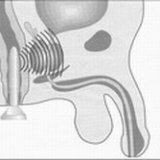Circumcision in men
 In our time, there are discussions about whether there is a need for men to circumcise. There are numerous reasons for such an operation and against it. Let's figure it out and find out if it's necessary to cut off what is given by nature.
In our time, there are discussions about whether there is a need for men to circumcise. There are numerous reasons for such an operation and against it. Let's figure it out and find out if it's necessary to cut off what is given by nature.
Why circumcision is done
Circumcision or circumcision is the removal of the prepuce by surgical intervention. It is conducted on the basis of religious beliefs, for the purpose of hygiene or in accordance with medical indications.
Many men agree to an operation at the request of a partner who does not like the appearance of the skin covering the head of a man's dignity. Other men go on circumcision because of fears that are associated with the accumulation of dirt under the foreskin, which often leads to the development of infections.
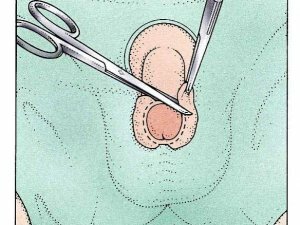 According to medical indications, circumcision is necessary for fusion of the foreskin with the glans penis. This pathology is called phimosis. Often, the disease self-healing, but for this, a man from childhood should push the head of the penis, conducting his hygiene.
According to medical indications, circumcision is necessary for fusion of the foreskin with the glans penis. This pathology is called phimosis. Often, the disease self-healing, but for this, a man from childhood should push the head of the penis, conducting his hygiene.
How is circumcision performed
Circumcision is performed with or without anesthesia. Newborn surgery is done without anesthesia. Adolescents undergo general anesthesia and men under local anesthesia. Local anesthesia is carried out as follows: the penis is treated with a special disinfectant solution, a rubber band is placed on the base of the sexual organ, and an anesthetic injection is made into the penis. After the injection, the penis ceases to be sensitive, and the doctor performs the operation.
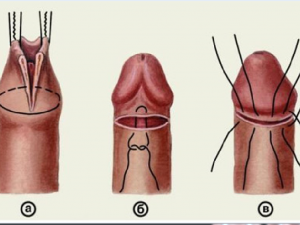 The foreskin is pulled back, fixing with the help of clamps. Then it is cut and removed, sewing the incision formed on the skin. Sutures are removed after two weeks. The duration of the operation is about twenty minutes.
The foreskin is pulled back, fixing with the help of clamps. Then it is cut and removed, sewing the incision formed on the skin. Sutures are removed after two weeks. The duration of the operation is about twenty minutes.
There is another way to remove the foreskin: after anesthesia, the foreskin is drawn and cut off by a special device, then seams are applied. Sometimes, after the operation, the sutures become inflamed, which is due to the urine entering them. You can get rid of the infection by taking antibiotics and keeping the seam hygiene.
Discomfort after operation
If circumcision is done in adulthood, then undesirable consequences may occur, as the penis head, hidden by the foreskin, is suddenly exposed. From the friction of the underwear there is a constant erection, which is very inconvenient. But after a few weeks the head adapts to other conditions, and the penis again remains at rest.
The benefits of circumcision
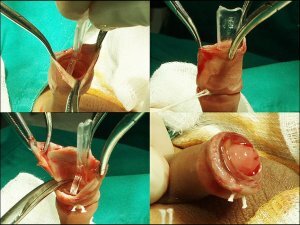 After removing the foreskin, a favorable environment for the development of various infections is no longer created. It is noted that it is the uncircumcised representatives of the stronger sex who are more likely to be infected with syphilis or gonorrhea. But according to doctors, this is most likely connected not with the presence of the foreskin, but with the lack of personal hygiene. After all, to be honest, not every man after the sexual act immediately goes to the shower.
After removing the foreskin, a favorable environment for the development of various infections is no longer created. It is noted that it is the uncircumcised representatives of the stronger sex who are more likely to be infected with syphilis or gonorrhea. But according to doctors, this is most likely connected not with the presence of the foreskin, but with the lack of personal hygiene. After all, to be honest, not every man after the sexual act immediately goes to the shower.
In old age, circumcision may be required in the case when for a long time the foreskin did not move away from the head and grew to it. In this case, the operation helps to relieve urination and care for the penis.
After the operation, the male head loses its former sensitivity, because of what a man can have sex for a long time. However, many circumcised men do not get past pleasure by making love in a condom.
Summing up the benefits of circumcision, I want to note that the most important plus is the hygiene of the penis head. Well, in the form of a supplement - many women are confident that it is the open head that looks much more attractive.
Cons of circumcision
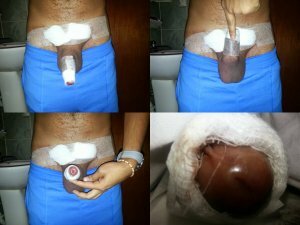 Now let's talk about what to clean up what is given by nature? The male head has a lot of nerve endings, giving the man an indescribable sense of pleasure. After circumcision the head becomes dry, besides constant friction about the underwear causes an unpleasant sensation.
Now let's talk about what to clean up what is given by nature? The male head has a lot of nerve endings, giving the man an indescribable sense of pleasure. After circumcision the head becomes dry, besides constant friction about the underwear causes an unpleasant sensation.
Risk of infection after the procedure of circumcision is minimal, but still there is. Therefore, men individually need to decide whether to do the operation. Much depends on the experience of the surgeon, who conducts circumcision, since man's dignity is quite a vulnerable place, which is very easy to cripple.
There is only one conclusion: a man who does not have problems with the foreskin and observes the hygiene of the body does not need any circumcision.


